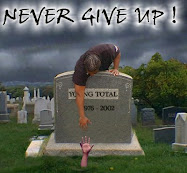Friday, April 3, 2009
Drop The Rock
By Brett Story
March 30, 2009
Hundreds of New Yorkers rallied in front of Gov. David Paterson's office March 25 to urge the repeal of Rockefeller Drug Laws. Instituted in the 1970s, the laws dole out mandatory sentences for minor infractions and disproportionately affect communities of color, 90 percent of those jailed under its auspices are black or Latino.
As a state senator Governor Paterson vocally criticized the laws and The Nation reported early in his term his administration's focus on overturning them.
The New York Times reports that along with the Democratic state assembly and senate, Governor Paterson has reached an agreement to dismantle the drug laws.
Monday, March 30, 2009
TOM JOYNER MORNING SHOW-CALL TO ACTION!

Subject: TheFlyJock's Blog: Act Now or Lose Our Voice That Comes Through Black Radio
Date: Thu, 26 Mar 2009 03:15:24 +0000
| |
| TheFlyJock's Blog: Act Now or Lose Our Voice That Comes Through Black Radio Tom Joyner, March 25 http://www.blackamericaweb.com/?q=blog_inner/7993/1573138/The%20Fly%20Jock
Yesterday there was an outpouring of love and support for the TJMS through e-mails, texts and phone calls letting us know how much we will be missed on Chicago radio. Many of you were looking for a call to action, and to you, I say this: One, thank you for caring enough to take time out of your busy life to let us know how you feel. Two, the most immediate call to action for people in Chicago and anywhere else where we aren’t heard is to listen on BlackAmericaWeb.com - which, by the way, had a record number of people tuning in to hear our show yesterday. And three, support the advertisers you hear on our stations, and let them know you’re supporting them because you heard them advertising on our show. Without boring you, I’d like to give you a quick lesson in black radio and what we are up against in this ever-changing world. We face a system that has never worked in the favor of black media and other factors, such as a new ratings system, and the country’s horrible economic state stacks even more odds against us. The bottom line is black radio will never be what it once was, and there’s absolutely nothing we can do about that. There are and will continue to be radio stations playing urban music, and of those few, the only way they will survive is if they are making money. They make money from the commercials they sell, and that’s based on them being able to prove that the people listening are good candidates for buying their products. It isn’t personal; it’s business. And as much as I appreciate the emotions expressed in the letters, texts and e-mail I’ve gotten, we can only move forward if we recognize the business we’re dealing with. Like all businesses, the success of black radio is based on supply and demand - not just for the station owners and the advertisers but for the audience too. You know what you want, and you know whether the radio stations you tune in to are providing it. As much as you love to hear R&B music, if that is all you wanted, you could load your iPod with your favorite songs and never tune in to black radio again. But you obviously want more than that, and you have fewer places to get it than ever before. So, the issue is much bigger than which urban D.J. you like better in the morning. The issue is whether the urban format is worth saving. The old saying “Give a man fish; you feed him for a day but teach a man to fish; you feed him for a lifetime” has never rung truer. If it had not been for the urban format, many of us would not have ever known the importance of radio advocacy and how a wrong can be righted with the power of our phone calls, pens, voices and votes. It has helped us to do everything from saving a sitcom from cancellation to electing the first African-American president. It has made us more accountable, more self reliant and more empowered. In the end, whether there are 50 black radio stations or two, you will have been victorious because you stood tall and lifted your voice. We have black radio to thank for that, and that’s something no man, no format, and no conglomerate can take away. So we move forward stronger, wiser and looking for a better way to do - and that’s a lot more than play music. |










